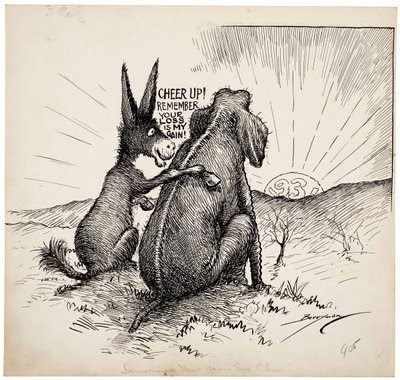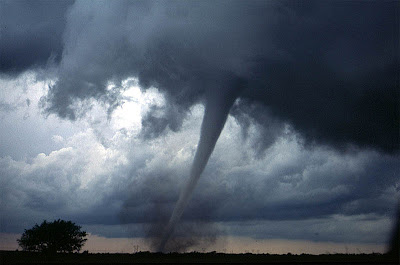I miss the old smoke filled rooms – sometimes. In the old days there were no passionate amateurs willing to bring on a political doomsday, just to muck things up. The process was dispassionate, calculated and handled by people who saw politics as a job, aided, of course, by political writers who supplied the passion in print. From such combinations, legends were born - such as this one I shall now relate.
On April Fools Day, 1920, bland faced Ohio political manager Harry Daugherty (above) was hastily packing his bags in his room at the old Waldorf Astoria hotel on Fifth Avenue in Manhattan. Into the room sauntered two reporters, seeking a quote. They taunted Daugherty on his boastful support for the turgid and mediocre Ohio Senator, Warren G. Harding for President. Nobody else thought Harding stood a chance. Just who were these senators that Daugherty claimed would support Harding at the Republican Convention, come June? When Daugherty refused to take the bait, the reporters suggested he must be expecting Harding to win the nomination in some hotel back room, by a small group of political managers, “reduced to pulp by the inevitable vigil and travail” of a deadlocked convention. Daugherty said nothing. So the reporter suggested r that Daugherty must be expecting the managers to collapse about 2:00 A.M. in a smoke filled room. Weary of the dialog, Daugherty responded off handed, “Make it 2:11". Then he grabbed his bags and headed out to catch the train back to Ohio.
The reporter turned that one sided conversation into this quote, which he stuck into Daugherty’s mouth; “I don't expect Senator Harding to be nominated on the first, second or third ballot, but I think we can well afford to take chances that about eleven minutes after 2 o'clock on Friday morning at the convention, when fifteen or twenty men, somewhat weary, are sitting around a table, some one of them will say, "Who will we nominate?" At that decisive time the friends of Senator Harding can suggest him, and can afford to abide by the result.”
And amazingly, that is almost exactly how it really happened. Except that the back room was a suite of meeting rooms in Chicago’s Blackstone Hotel at the corner of Michigan Avenue and Balboa - room numbers 408 through 410, with Room 404 set aside as the reception room.
The suite had been rented by Will Hays, the big-eared big-talking “mighty little ear of corn” from Indiana. He was the Republican National Chairman, and had hopes of being President himself in 1920. And maybe the greatest compliment you can pay the professional politicians of that era is that at least they did not let Will Hays become President.
The Republican Convention that June was officially taking place 9 blocks south of the Blackstone hotel, in the old Chicago Coliseum on South Wabash Avenue. This cavern had been home to every Republican Convention since 1904. It is worth noting that the building had originally been constructed to house a prison, Richmond’s Libby prison, bought lock, stock, and barrel by a Chicago candy millionaire and shipped north to form the centerpiece of a Civil War Museum. The museum went bust in 1899, and the owner “re-imagined” the space as a public meeting center.
It was into this den of iniquity that some 2,000 delegates and their alternates marched on Tuesday June, 8th, 1920, sixty years after Republicans had first met in Chicago to nominate Senator William Seward for President, but instead chose Abraham Lincoln. It was an ominous bit of history to consider if you were General Leonard Wood or Illinois Governor Frank Lowden, as they were considered the front runners for the 1920 Republican nomination.
The dour faced Lowden (above) wanted to be president so badly that when Governor, when both houses of the Illinois state legislature voted to abolish the death penalty, he had vetoed the bill, proving again that politicians are even willing to kill people to win a few votes.
In contrast, Leonard Wood (above) claimed to have little political hunger. He was a Medal of Honor winner who had graduated medical school and then risen to Army Chief of Staff. He said he wanted to be President out of a sense of duty. While Will Hays had not entered any of the twenty primaries held that year, he still had hopes that Wood and Lowden would deadlock, and the convention would turn to the little Hoosier to beak the tie. There were in fact a number of candidates with the very same plan.
The convention finally got down to the balloting on Friday evening, June 11th, and immediately things started looking up for Hays. On the first ballot Wood led with 285 votes, Lowden showed 211, Senator Hiram Johnson, of California, a Teddy Roosevelt progressive, was third with 133 votes. Far behind was Governor William Spool of Pennsylvania with 84 votes, followed by New York’s Nicholas Butler with 69 votes and Ohio’s favorite son, Senator Warren G. Harding, who had lost in the Indiana primary and could muster just 65 votes. Six other candidates held the remaining 132 delegates.
On the second ballot Wood gained just ten votes, while Governor Lowden’s total grew by 40. But still nobody was close to the 439 votes needed to nominate. General Wood reached his peak on the fourth ballot with 314 votes, and then his support started to slip. Governor Lowden beat him with 311 votes on the fifth ballot. Still, no one seemed to be gathering enough support to win it all. And the longer this went on, the less confidence actual voters would have in any eventual choice. So the professionals stepped in and the convention adjourned for the night. The negotiations shifted to the infamous fourth floor rooms at the Blackstone hotel.
Actually political junkies were meeting all over Chicago that night, but Hays’ rooms at the Blackstone got all the publicity because that was where Associated Press reporter Kirke Simpson was working. He was there to cover Harry Daugherty, because, as you have seen, Harry was always good for a quote, even if you had to spoon feed it to him.
Also present was George Harvey, who ran Harper publishing, and Republican Senators Wadsworth, Calder, Watson, McCormick and Lodge, Governor Smoot, political fixer Joe Grundy, and Lawyer Charles Hillers, counsel to the R.N.C., as well as his client, R.N.C. Chief, Will Hays. Their problem was that none of them could agree upon who the party should rally around, either.
It was, by general agreement, the original “Smoke filled room”, and the 130 pound Hays was the host. Even though he neither smoked nor drank himself, Hays kept the cigars lit and the booze flowing “Neighbor”, he and once said to Herbert Hoover, “I want to be helpful.” It was his natural instinct.
Harry Daugherty’s (left) natural instinct, on the other hand, was his drive for his man. He said of Harding (right), “I found him sunning himself, like a turtle on a log, and I pushed him into the water. “
Since the top three vote 'getters' were not willing to compromise with each other, the Senators were now looking for “The best of the second raters.”, and Daugherty suggested that Harding was their man. There is no indication that anybody even mention Will Hays - not even Will Hays, who was in the room..
They dispatched a small delegation upstairs to Hardings’ room, where they roused the stunned Harding from his bed. While he stood before them in this pajamas, they asked him point blank if there were any embarrassing episodes in his past. Harding might have said that giving a job interview while standing in his pajamas might qualify as an embarrassing moment, but he did not. Instead Harding swallowed and said, “No”. He was lying of course, but that would not come out until Harding was long dead.
It wasn't as if the party managers issued orders and the party regulars fell in line. It would take five more ballots before the crowd at the Colosseum would give up out of exhaustion and hand the nomination to Harding. But as of 2:15 A.M., the decision has been made, just as the reporters in New York had written that Daugherty had predicted - if f nobody seems to be winning, we will rally around Harding and make do. What a way to pick a president! And it worked.
At 5 A.M. on Saturday June 12, 1920, Kirke Simpston filed a story that included the following phrase, “Harding of Ohio was chosen by a group of men in a smoke-filled room early today.” And that is how the phrase "smoke filled room" entered the vernacular. The connotation became negative because after Warren G. Harding won in a landslide, he and his “Ohio Gang” - his buddies, including Harry Daugherty - moved to Washington D.C. and started selling everything that wasn't nailed down. Many of them ended up in jail, or disgraced, or at least spending a lot of the graft they had collected on lawyers.
Harding appointed Harry Daugherty (above) as his Attorney General. And after three heady years, Harry was forced to resign when his chief aide, Jess Smith, was caught taking kickbacks from bootleggers. Smith had been collecting the kickbacks for his boss, Harry Daugherty, but the professional politicians in Washington decided not to prosecute Harry. And luckily Smith committed suicide, so Harry was allowed to just resign, Besides, Harry was just one of a dozen Harding appointees who either went to jail, or ought to. As Forest Gump might have put it, Presidents are like a box of chocolates. You never know what you're gonna get. Take little Will Hays'
Will Hays served as Hardings’ Postmaster General. But after only one year he smelled the impending scandals coming and he got out. In 1922 Hays took another job, running the Hays Production Code office, which set standards for on-screen morality in the Hollywood film industry. It was the Hays Commission which gave us forty years of married couples sleeping in twin beds, no acknowledgement of drug use (which was going on), no adultery in marriage without retribution, and endless stories with sacerin sweet "Hollywood" endings. It was the Hays' Commission that turned Rhett Butler’s exit line as he walked out on Scarlet O’Hara into a major social crises, even though the line appeared in one of the most widely read books in America, "Gone With the Wind". It seemed that Mr. Hays had built his entire career selling smoke and mirrors, and he was not going to get out of that business just because he had gotten out of politics.
- 30 -























































































